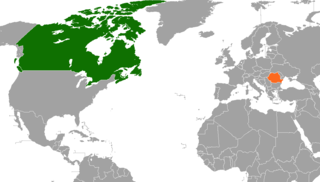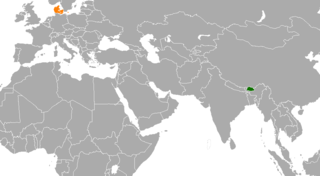
Cyprus is a member of the United Nations along with most of its agencies as well as the Commonwealth of Nations, World Bank, International Monetary Fund and Council of Europe. In addition, the country has signed the General Agreement on Tariffs and Trade (GATT) and the Multilateral Investment Guarantee Agency Agreement (MIGA). Cyprus has been a member of the European Union since 2004 and in the second half of 2012 it held the Presidency of the Council of the European Union.

After independence in 1966, Guyana sought an influential role in international affairs, particularly among Third World and non-aligned nations. It served twice on the UN Security Council. Former Vice President, Deputy Prime Minister, and Attorney General Mohamed Shahabuddeen served a 9-year term on the International Court of Justice (1987–96). In June 2023, Guyana was elected as a non-permanent member to the UN Security Council. The country will serve on the Council for a period of two years, beginning in January 2024.

Though the Ministry of Foreign Affairs (MOFA) is the government agency which is responsible for conducting the foreign relations of Nepal, historically, it is the Office of Prime Minister (PMO) which has exercised the authority to formulate the country's foreign policies. As a landlocked country wedged between two larger and far stronger powers, Nepal has tried to maintain good relations with both of its neighbors, People's Republic of China and Republic of India. However, the relationship between Nepal and India was significantly hampered by the 2015 Nepal blockade when the Government of Nepal accused India of mimicking "Russia-Ukraine" tactics by using ethnically Indian residents of Nepal to cause unrest along Nepal's southern border. India denied the allegation and said the unrest were an internal affair. For the most part though, Nepal has traditionally maintained a non-aligned policy and enjoys friendly relations with its neighboring countries and almost all the major countries of the world.

Eswatini is a member of the United Nations, the Commonwealth of Nations, the African Union, the Common Market for Eastern and Southern Africa, and the Southern African Development Community. Currently, the Kingdom of Eswatini maintains 11 embassies and High Commissions along with 15 consulates and other representations around the world, while there are five embassies and High Commissions in Eswatini as well as 14 consulates and other representations.

Foreign relations of Tajikistan are based on a desire to secure foreign investment and promote regional security while ensuring Tajikistan's independence. Sirodjidin Aslov is the current Foreign’s Minister of Tajikistan.
The foreign relations of Thailand are handled by the Ministry of Foreign Affairs of Thailand.

Bhutan has diplomatic relations with 54 of 193 member states of the United Nations and the European Union. Bhutan's limited number of such relations, including the absence of formal relations with any of the permanent members of the United Nations Security Council, is part of a deliberate isolationist policy of limiting foreign influence in the state. This stance has been safeguarded by close relations with India, of which Bhutan has previously been considered a protected state.
Global Affairs Canada is the department of the Government of Canada that manages Canada's diplomatic and consular relations, promotes Canadian international trade, and leads Canada's international development and humanitarian assistance. It is also responsible for maintaining Canadian government offices abroad with diplomatic and consular status on behalf of all government departments.

The foreign relations of Canada are Canada's relations with other governments and nations. Canada is recognized as a middle power for its role in global affairs with a tendency to pursue multilateral and international solutions. Canada is known for its strong commitment to international peace and security, as well as being a mediator in conflicts, and for providing aid to developing countries. The "golden age of Canadian diplomacy" refers to a period in Canadian history, typically considered to be the mid-20th century, when Canada experienced a high level of success in its foreign relations and diplomatic efforts.

Canadian-Romanian relations are the bilateral relations between the governments of Canada and Romania. Canada has an embassy in Bucharest. Romania has an embassy in Ottawa and three consulates-general. Romania has also three honorary consulate general in Moncton, Québec and Calgary.

The Ministry of Foreign Affairs and External Trade is the Bhutanese government ministry which oversees the foreign relations of Bhutan. The Royal Government of Bhutan established the Development Ministry in 1968, which was a precursor to the institution of the Department of Foreign Affairs in 1970 and subsequent up gradation to a full-fledged ministry in 1972.

The Bahamas has a strong bilateral relationship with the United Kingdom, represented by a High Commissioner in London. The Bahamas also associates closely with other nations of the Caribbean Community (CARICOM).

Bhutan–Denmark relations refers to the current and historical relations between Bhutan and Denmark. Denmark has a liaison office in Thimphu. Diplomatic relations were established in 1985. Denmark is the second-largest provider of development aid to Bhutan, after India.

The bilateral relations between the Kingdom of Bhutan and the Kingdom of Thailand were established in 1989. Thailand is one of the only 54 nations with formal diplomatic relations with Bhutan.

Bhutan–Pakistan relations refer to foreign relations between Bhutan and Pakistan. Relations have been active at least since 2004. Both nations are members of the South Asian Association for Regional Cooperation (SAARC) and the United Nations. Neither country has a resident ambassador.

The Chief of Protocol (CoP) is a government official who heads the protocol department of a state, overseeing security, logistics and etiquette in diplomatic and national functions. A protocol department decides on diplomatic immunity and privileges, diplomatic host security, diplomatic use of airspace and it is the guardian of official etiquette. Advance protocol teams, usually headed by the Chief of Protocol, engage as first contact between governments for the planning of bilateral and multilateral summits and visits.

Bhutan–Spain relations are the bilateral relations between Bhutan and Spain.

Bhutan–Germany relations are the bilateral relations between Bhutan and Germany. Germany has a non-resident embassy housed in New Delhi. Bhutan is represented in Germany by its embassy in Brussels. Both Germany and Bhutan have honorary consuls in each of their countries.

















